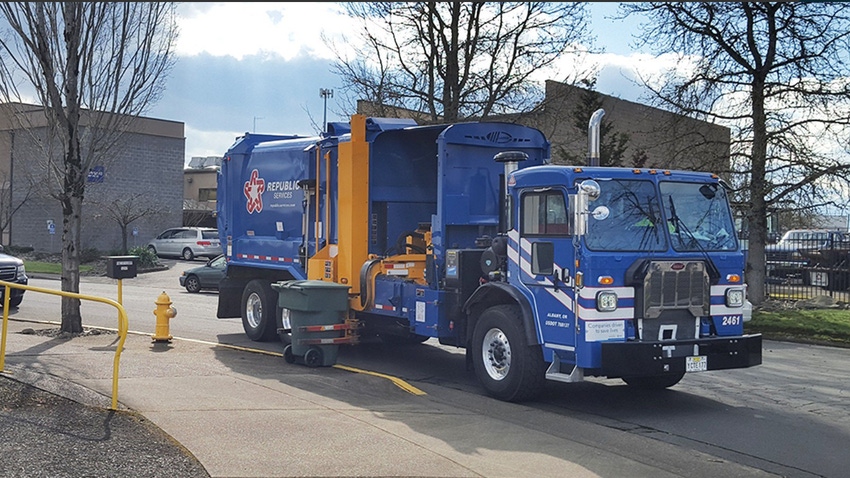Growth was primarily driven by strong pricing across the company’s collection, disposal and recycling processing businesses.

Phoenix-based Republic Services Inc. ended the first quarter of 2019 on a positive note, despite facing a big headwind from a special waste project. The company reported $2.5 billion in revenues, a 1.8 percent increase from the year prior. This growth was mainly driven by strong pricing across the company’s collection, disposal and recycling processing businesses.
Additionally, Republic reported net income of $234.2 million, or $0.72 per diluted share, for the first quarter of 2019, versus $237.7 million, or $0.72 per diluted share, for the comparable 2018 period.
"We are very pleased with our first quarter results, which included solid earnings and free cash flow, an $86 million investment in acquisitions and $233 million returned to shareholders through dividends and share repurchases," said Donald W. Slager, president and CEO of Republic Services, in a statement. "Given the strength of our solid waste business and the collective efforts of the Republic Services team, we are reaffirming our 2019 adjusted EPS and free cash flow guidance, despite a continued decline in recycled commodity prices."
Here are some other highlights from the company’s earnings:
Adjusted net income for the three months ended March 31, 2019, was $237.2 million versus $246.3 million a year ago.
Adjusted EBITDA was $699 million. Adjusted EBITDA margin was 28.3 percent of revenue and in line with the company's full-year margin guidance of 28.3 to 28.5 percent of revenue. As expected, EBITDA margin decreased 50 basis points versus the prior year due to known headwinds, including the expiration of construction and demolition tax credits and a decrease in high-margin special waste volume due to the anniversary of a large event-driven project.
Adjusted free cash flow was $349 million, down from $356 million in the prior year period.
Total core price was 4.7 percent and average yield was 2.9 percent, marking the company’s highest pricing level in nearly a decade.
Residential collection contributed $557.4 million in revenue, up from $548.7 million in 2018. Small-container revenue increased from $749.1 million in 2018 to $777.9 million in 2019. And large-container revenue increased from $516.2 million in 2018 to $530.7 million in 2019.
Transfer revenue increased from $288.5 million to $294.4 million year over year.
Landfill revenues increased from $550.0 million to $536.5 million year over year.
Core price increased revenues by 4.7 percent, which consisted of 5.7 percent in the open market and 3.2 percent in the restricted portion of the business.
Republic invested $86 million in acquisitions during Q1 2019. In April, the company has invested an additional $56 million and now expects the full-year investment in acquisitions to total approximately $300 million.
Average yield in the collection business was 3.5 percent, which included 3.6 percent yield in the small container business, 3.9 percent yield in the large container business and 2.9 percent yield in the residential business.
Volumes increased 0.2 percent in Republic’s large container business. Volumes in the small container business decreased 0.5 percent, and volumes in the residential collection business decreased 2.1 percent.
Landfill volumes decreased 3.5 percent. C&D volumes increased 6.4 percent, special waste volumes decreased 15.7 percent and municipal solid waste volumes increased 6.5 percent.
In the first quarter, Republic’s average recycled commodity price per ton decreased 17 percent to $93, down from $112 per ton in the prior year. Its April price per ton is estimated to be approximately $85.
Slager mentioned that Republic is still facing a recycling headwind, but “Republic was sort of the tip of the spear in the marketplace when it came to attacking the recycling issue, so we've got rollover benefits from what we did last year.”
When asked about mergers and acquisitions and the type of environment the company is seeing to make it go forward, Slager said: “There are frankly a lot of really attractive companies right now who are coming to a place in their lifecycle who are thinking about monetizing their life's work, so we don't force deals. We don't do bad deals. We don't chase deals. We're looking still at companies that have a really high-quality revenue base, meaning a large percentage of reoccurring revenue, revenue under contract, small container business and permanent contractor roll-up business. We've been very selective and hats off to the deal team and to our development group. … I think it's just that we're in a good place in time where maybe generationally people need self-updates. I don't think there's any one driver we've seen that's tax related or anything like that. We're going to continue to consolidate the business. That's how we've built Republic. We'll continue to be in the hunt for good deals.”
When asked about Republic’s OneFleet program and maintenance and labor costs, Republic Services Chief Operating Officer Jon Vander Ark said: “On maintenance costs, we're fighting underlying inflation of parts cost on increasingly sophisticated vehicles, so we're doing a great job of maintaining that on the maintenance side. On the labor cost side, we're going through routing efficiencies and using technology, but [there are] lots of initiatives and lots of effort underway there to understand it. We want to service, but first of all, we want to be safe. We want to service the customer and pick them up every time, but then we want to do that efficiently. [There are] lots of efforts underway to figure out how we do that, and we’re showing some real progress in fleet market.”
Republic continued to convert contracts from CPI to a more favorable pricing mechanism for the annual price adjustment. It now has approximately $685 million in annual revenue that is tied to either a waste-related index or a fixed-rate increase of 3 percent or greater.
The company made the World's Most Ethical Companies List by the Ethisphere Institute for the third consecutive year, and it was named to Barron's 100 Most Sustainable U.S. Companies list for the second consecutive year.
About the Author(s)
You May Also Like




